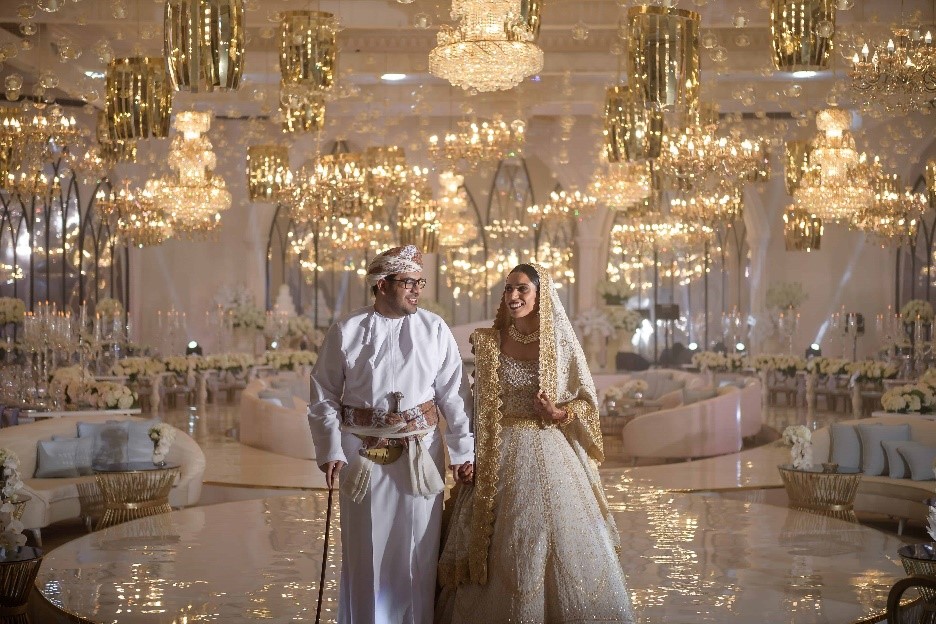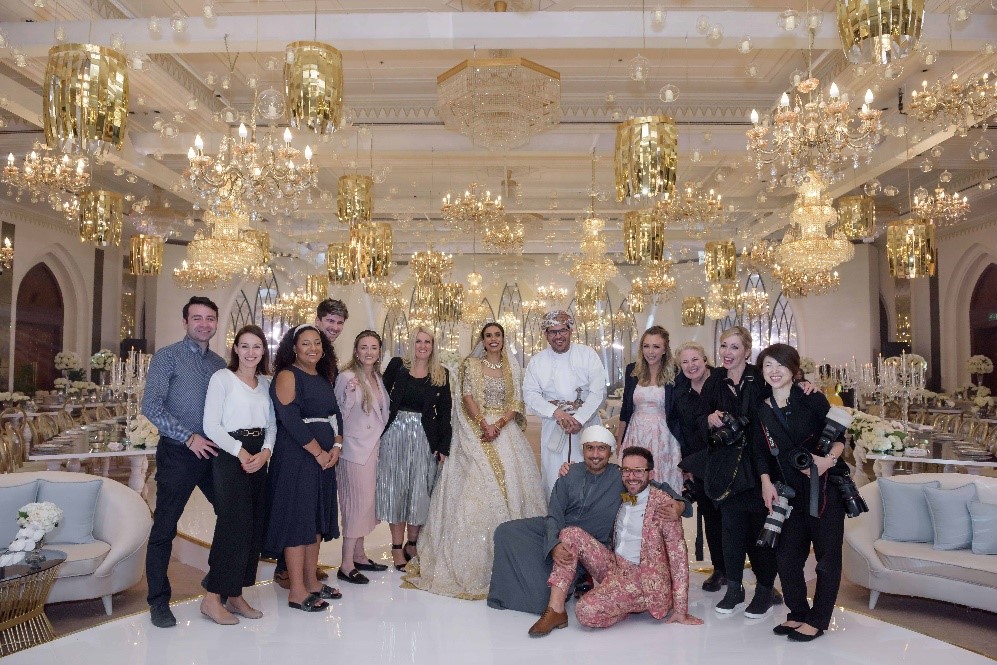The Rich Heritage of Omani Weddings
Experience the Vibrant Traditions of Oman’s Joyful Weddings,Oman is a country where culture and tradition are woven deeply into everyday life, and weddings are no exception. Celebrations are grand, colorful, and full of life, reflecting the rich heritage of Omani society. A wedding in Oman is not just a union of two individuals; it is a coming together of families, communities, and generations, all sharing in joy and celebration. Each ceremony is filled with rituals that have been passed down through centuries, preserving the essence of Omani identity.
Omani weddings are known for their grandeur and attention to detail. From the choice of attire to the music, dance, and food, every aspect is carefully crafted to honor both tradition and the happiness of the couple. These celebrations are not just about the bride and groom but also about showcasing the cultural pride of Oman.
Engagement Ceremonies: A Celebration of Commitment
The journey toward marriage in Oman often begins with a formal engagement ceremony. Known as “khutbah,” this event is an important ritual that brings families together to officially announce the union. It is a time for sharing happiness, blessings, and advice for the couple’s future.
During the engagement, families exchange gifts, including jewelry, perfumes, and traditional Omani clothing. The ceremony is often held in a family home or a beautiful venue decorated with flowers, lights, and intricate fabrics. Music plays an important role, creating an atmosphere of joy and celebration. The engagement is not only a declaration of love but also a reaffirmation of the values and traditions that will guide the couple throughout their life together.
Traditional Attire: Beauty and Symbolism
One of the most striking features of Omani weddings is the traditional attire worn by the bride and groom. The bride’s dress, known as the “khunjar dress” or wedding gown, is often elaborately embroidered with gold or silver thread. These dresses are designed to reflect elegance, modesty, and cultural pride. Brides often wear delicate jewelry, including necklaces, earrings, and bracelets, sometimes passed down through generations as family heirlooms.
The groom typically wears the “dishdasha,” a long white robe that symbolizes purity and respect. He may also wear a “muzzar,” a traditional headpiece, and sometimes carries the “khanjar,” a ceremonial dagger that represents strength and heritage. The combination of clothing, accessories, and ceremonial items creates a visually stunning and culturally rich atmosphere that captures the essence of Omani traditions.

Pre-Wedding Festivities: Music, Dance, and Celebration
Before the wedding day itself, Omani families often organize pre-wedding festivities that bring communities together. These events may include henna nights, where the bride’s hands and feet are adorned with intricate henna designs. Henna ceremonies are accompanied by music, singing, and traditional dances, creating a lively and joyful atmosphere.
Music and dance are central to Omani wedding celebrations. Traditional instruments like the oud, drums, and tambourines accompany folk songs that have been performed for generations. Dance forms such as the “razha” and “al-aya” showcase the rich cultural heritage and provide opportunities for both young and old to participate in the festivities. The energy, laughter, and shared joy make these pre-wedding events unforgettable experiences for everyone involved.
The Wedding Ceremony: A Blend of Tradition and Spirituality
The main wedding ceremony in Oman is a blend of cultural rituals and religious practices. Islamic traditions play an important role, with prayers and blessings offered to ensure the couple’s happiness and prosperity. The ceremony may take place in a mosque, a family home, or a specially arranged venue, depending on family preferences and social norms.
During the wedding, vows are exchanged in the presence of close family members, and a marriage contract, or “nikah,” is signed. This formalizes the union according to Islamic law and tradition. Guests shower the couple with blessings and gifts, wishing them a harmonious and prosperous life together. The ceremony reflects not only the love between the bride and groom but also the importance of family, community, and faith in Omani society.
The Wedding Feast: Culinary Delights of Oman
No Omani wedding is complete without an extravagant feast that celebrates the country’s rich culinary heritage. Traditional dishes such as shuwa, a slow-cooked spiced lamb, are often the centerpiece of the meal. Other specialties include majboos, a fragrant rice dish with meat or fish, and halwa, a sweet dessert made from sugar, rose water, and nuts.
Guests are treated to a variety of dishes that reflect the diversity and richness of Omani cuisine. The presentation is as important as the flavors, with food served on large platters that encourage sharing and togetherness. The wedding feast is more than just a meal; it is a symbol of hospitality, generosity, and communal joy.
Post-Wedding Traditions: Celebrating the Newlyweds
After the wedding day, Omani families continue the celebrations with post-wedding traditions. These may include visits to the bride and groom’s homes, exchanging gifts, and organizing small gatherings with extended family and friends. These events allow everyone to spend quality time together, strengthen bonds, and offer guidance and support to the newlyweds.
Music, dance, and storytelling often continue during these post-wedding events. Elders share advice and stories about marriage, while younger family members participate in playful games and dances. These traditions highlight the importance of family involvement and cultural continuity, ensuring that each generation remains connected to Omani heritage.
Regional Variations: Diversity Within Tradition
While certain rituals are common across Oman, regional variations add unique flavors to wedding celebrations. Coastal areas may incorporate maritime traditions, while desert regions might emphasize Bedouin customs. The style of music, dance, and even attire can differ depending on the region, making each wedding a distinctive experience.
These regional differences enrich the cultural tapestry of Omani weddings. They allow families to honor local customs while maintaining the core values of love, respect, and community. Whether in a bustling city or a remote village, Omani weddings remain vibrant, inclusive, and deeply meaningful.

Modern Influences on Traditional Weddings
While tradition remains at the heart of Omani weddings, modern influences are also evident. Couples may choose contemporary wedding venues, hire professional photographers, and incorporate international elements into their celebrations. Social media has also influenced how weddings are documented and shared, allowing friends and family from around the world to participate virtually.
Despite these modern touches, the essence of Omani weddings remains rooted in cultural heritage. The balance between tradition and modernity allows couples to celebrate in ways that reflect their personal tastes while honoring their family and community values. This blend ensures that weddings continue to be joyous, memorable, and culturally significant events.
Weddings as Cultural Celebrations
In Oman, weddings are more than just personal milestones; they are cultural celebrations that reflect the values, traditions, and identity of the nation. Each wedding is a testament to the importance of family, community, and shared joy. They provide an opportunity to honor heritage, pass down traditions, and create memories that last a lifetime.
The grandeur, warmth, and vibrancy of Omani weddings make them unique and unforgettable. From engagement ceremonies to post-wedding gatherings, every event is infused with music, dance, culinary delights, and heartfelt celebrations. These ceremonies showcase the beauty of Omani culture while celebrating love, unity, and happiness.
Preserving Tradition for Future Generations
Omani weddings serve as a bridge between generations, connecting the past, present, and future. Families take pride in preserving rituals, attire, music, and culinary traditions, ensuring that each wedding reflects the richness of Oman’s cultural heritage. Younger generations are actively involved in learning and participating in these traditions, which helps maintain continuity and respect for cultural values.
By celebrating weddings with such care and devotion, Omanis create a legacy of love, community, and cultural pride. Each wedding becomes a story of heritage and joy, inspiring future generations to honor their traditions while embracing modernity.
Omani weddings are a mesmerizing blend of culture, tradition, and joy. They celebrate not just love between two people but also the unity of families and communities. From intricate attire and elaborate ceremonies to music, dance, and culinary delights, these celebrations are rich in symbolism, happiness, and heritage. Experiencing an Omani wedding is a journey into a world where tradition and modernity coexist beautifully, creating memories that last a lifetime.
Do follow Gulf Magazine on Instagram.
Also Read – Oman’s Pearl Diving: Explore Its Rich and Fascinating Legacy



